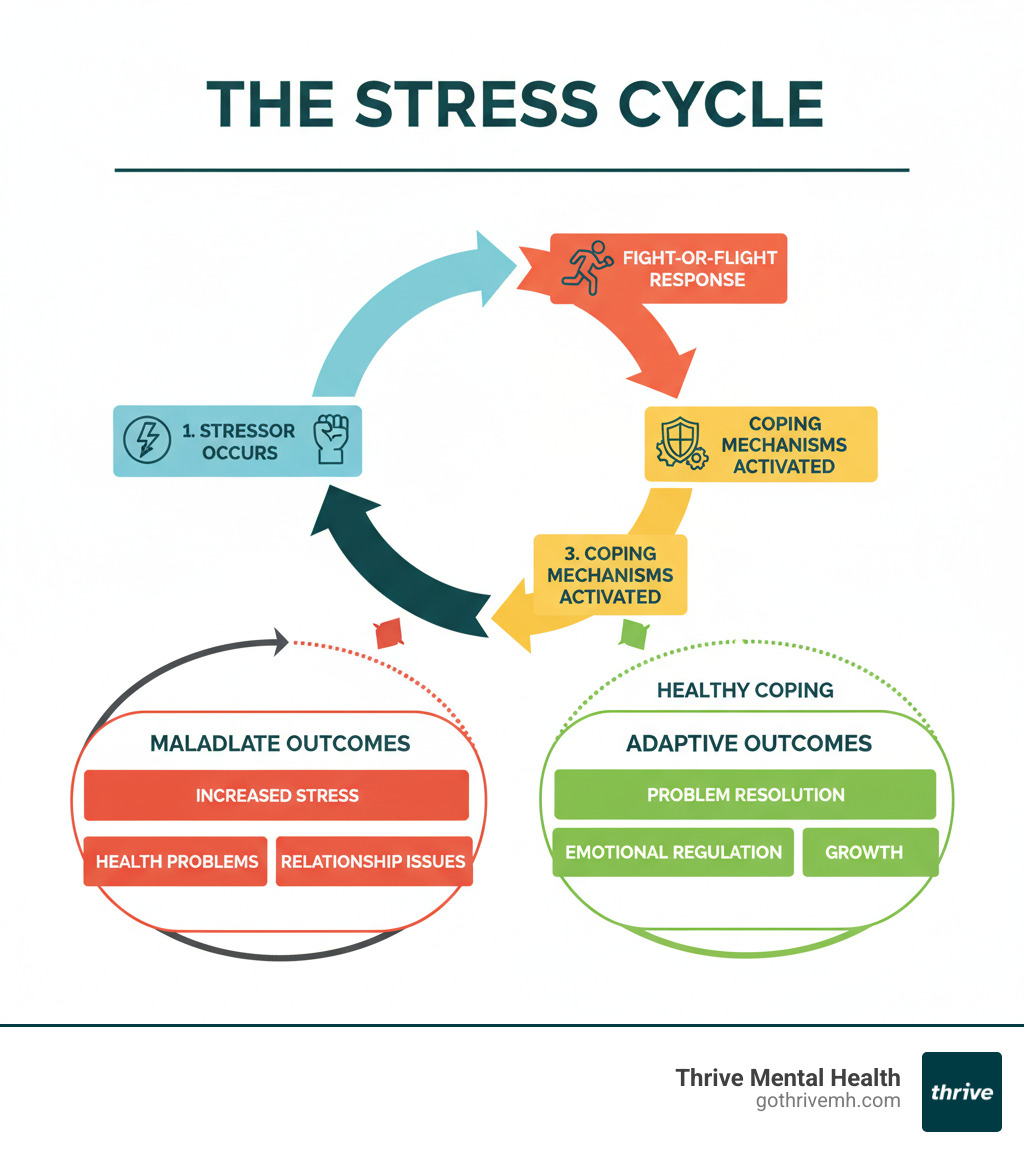Keep Calm and Cope On – Effective Ways to Manage Stress

Coping: 15 Effective Strategies for Calm
Coping: Cut Stress in 10 Minutes a Day and Avoid Burnout
Coping is how we consciously manage situations we appraise as stressful. When life throws challenges your waybe it work pressure, relationship issues, or unexpected setbacksyour coping skills determine whether you’ll thrive or just survive.
Quick Answer: Essential Coping Strategies
- Problem-focused: Take direct action to solve the issue.
- Emotion-focused: Manage your emotional response (e.g., meditation, journaling).
- Meaning-focused: Find purpose or lessons in difficult situations.
- Social coping: Seek support from friends, family, or professionals.
- Healthy avoidance: Use temporary distraction when overwhelmed.
Research shows that developing a “battery of coping strategies” helps people handle stress better, with less anxiety and depression. Effective copers are flexible; they adapt their strategy to the situation rather than relying on a single approach.
Unfortunately, many people fall into maladaptive coping patterns like substance use or complete avoidance. These might offer temporary relief but often worsen problems over time.
The good news? Coping skills can be learned and improved at any age. Building a toolkit of healthy coping strategies is a valuable investment in your mental health.
I’m Anna Green, LMHC, LPC, Chief Clinical Officer at Thrive Mental Health. I’ve spent years helping people develop effective coping strategies through programs like CBT and DBT, and I’ve seen how the right skills can transform a person’s life.

Simple guide to coping terms:
Understanding Your Coping Style: The 5 Main Approaches
There’s no one-size-fits-all approach to coping with stress. Effective coping is like having a well-stocked toolbox—you need different tools for different problems.
The key is flexibility. Research shows that people who match their strategy to the situation handle stress better than those who rely on one approach. Your personality, beliefs, and the nature of the stressor determine which coping style works best. How personality influences coping styles varies dramatically from person to person.
For example, a controllable stressor like a work deadline calls for a different response than an uncontrollable stressor like a loved one’s illness. The former responds well to problem-solving, while the latter may require more emotion-focused strategies.
Let’s explore the five main coping approaches for your stress-management toolkit:
Problem-Focused Coping
This is your direct-action approach. Problem-focused coping means tackling the source of your stress head-on through active problem-solving, taking control, and making a plan.
This strategy is ideal for controllable stressors. Feeling overwhelmed by debt? Creating a budget is classic problem-focused coping. Struggling with a work project? Breaking it down and seeking information gets you moving.
Research shows this approach can help reduce burnout, as actively changing your circumstances often brings the fastest relief.
Emotion-Focused Coping
When you can’t control a situation, emotion-focused coping is essential. Instead of changing the situation, you focus on managing your emotional reactions and soothing negative feelings.
If a difficult conversation leaves you upset, you can’t take back what was said. But you can meditate to calm your mind, use journaling to process feelings, or practice deep breathing to center yourself.
This approach works best for uncontrollable stressors. If you need help managing difficult emotions, there’s more info about Emotional Support Online that might be useful.
Meaning-Focused Coping
Meaning-focused coping involves finding purpose or lessons in stressful situations. It’s about positive reframing, practicing gratitude, and drawing on spiritual beliefs to make sense of difficult experiences.
Losing a job, while initially devastating, could be reframed as an opportunity to explore a new career. This isn’t toxic positivity; it’s about genuine post-traumatic growth.
Mastering this approach can lead to stronger relationships, increased self-worth, and a deeper appreciation for life.
Social Coping (Support-Seeking)
We aren’t meant to handle stress alone. Social coping means leaning on others for support, asking for help, and sharing feelings with trusted people. It’s about building connections that weather life’s storms.
This could be talking through a problem with a friend, joining a support group, or just letting someone know you’re struggling. Emotionally supportive relationships are a powerful buffer against stress. The role of social resources in reducing stress is significant.
Sometimes, you just need someone to listen and remind you that you’re not alone.
Avoidance Coping
Avoidance coping involves ignoring the problem, using distraction, or denial. This can be healthy in the short term, like taking a mental health day to recharge after a stressful week.
However, it becomes maladaptive long-term when it involves constantly ignoring deadlines, refusing to acknowledge serious problems, or using substances to numb feelings. Chronic avoidance is linked to higher rates of PTSD, anxiety, and depression. For more on this, see Understanding Post-Traumatic Stress Disorder (PTSD): Symptoms, Causes, and Treatment Options.
Effective copers are flexible, choosing the right tool for each unique situation.
15 Healthy Coping Mechanisms You Can Use Today

Building a robust coping toolkit is about having options. When life gets overwhelming, you need adaptive strategies ready, like a first-aid kit for your mental health. Here are 15 mechanisms you can use:
- Mindfulness and meditation: Pay attention to the present moment without judgment. This practice creates space from racing thoughts and is proven to reduce anxiety. You can start with just five minutes a day.
- Deep breathing exercises: This is your secret weapon for instant calm. Deep breathing tells your nervous system to relax. Try the 4-7-8 technique: inhale for 4 counts, hold for 7, and exhale for 8.
- Journaling: Writing down what’s bothering you helps process emotions and can reveal solutions you couldn’t see before. It gets worries out of your head and onto paper.
- Cognitive reframing: Become the editor of your thoughts. Instead of accepting a negative interpretation, challenge it. “This is a disaster” becomes “This is challenging, but I can handle it.” This is a core technique in Cognitive Behavioral Therapy (CBT).
- Regular exercise: A natural mood booster, exercise releases endorphins and burns off stress hormones. Even a 20-minute walk can make a difference. To Exercise on a regular basis is a reliable way to improve mental health.
- Balanced diet and hydration: Your diet directly impacts your ability to cope. Nutrient-rich foods and proper hydration give your brain the fuel it needs to regulate emotions.
- Quality sleep: Sleep isn’t a luxury; it’s essential coping infrastructure. Aim for 7-9 hours nightly to improve emotional regulation and handle stress better.
- Spending time in nature: Even 20 minutes outdoors can lower cortisol levels and improve your mood. A local park works just as well as a mountain trail.
- Engaging in hobbies: Hobbies provide a sense of accomplishment and joy, offering a healthy distraction and a break for your worried mind.
- Using humor: Laughter can change your brain chemistry, reduce muscle tension, and shift your perspective. Finding something to laugh about is a powerful coping strategy.
- Practicing self-compassion: Treat yourself as you would a good friend. Instead of harsh self-criticism, try gentle understanding. This reduces shame and promotes healing.
- Progressive muscle relaxation: By tensing and relaxing different muscle groups, you learn to release the physical tension that stress creates in your body.
- Setting boundaries: This is active coping. Learning to say “no” protects your energy and prevents stress before it overwhelms you.
- Time management: Break large, overwhelming tasks into smaller, manageable steps. This reduces intimidation and provides a sense of progress.
- Seeking social connection: Talking with trusted friends or family provides emotional support and fresh perspectives. Strong relationships are a crucial buffer against stress.
Start with one or two strategies that resonate with you and practice them regularly. The goal is to build the skills to manage stress with greater ease and resilience.
The Dangers of Unhealthy Coping: What to Avoid
If you are in crisis or having thoughts of self-harm, please call or text 988 to reach the Suicide & Crisis Lifeline. You are not alone.
Callout: If you’re in crisis, call/text 988 right now. You are not alone.

Not all coping strategies are helpful. While healthy mechanisms help us grow, maladaptive coping can trap us in a destructive cycle that makes problems worse.
Maladaptive strategies might feel good in the moment but ultimately harm our mental health and relationships. Statistics show that unhealthy coping is linked to risky behaviors and serious mental health conditions like PTSD, anxiety, and depression. Studies reveal that maladaptive coping mechanisms significantly impact psychopathology.
Here are common unhealthy strategies to avoid:
- Substance use: Using alcohol or drugs to numb feelings provides temporary relief but prevents you from dealing with the root cause and can lead to addiction.
- Emotional suppression: Bottling up emotions creates immense pressure that can eventually lead to an outburst. Emotions are signals that something needs attention.
- Excessive avoidance or denial: Ignoring a problem doesn’t make it disappear; it usually gets worse. Chronic avoidance prevents growth and strains relationships.
- Rumination: This is an endless loop of negative thoughts. It feels productive but only intensifies distress without leading to a solution.
- Self-harm: This is a serious maladaptive coping mechanism where physical pain is used for relief from overwhelming emotional pain. It is a sign that professional help is urgently needed.
- Emotional eating: Using food to manage stress or loneliness can create a cycle of shame and physical health issues. Food cannot fill an emotional void.
- Social withdrawal: Isolating yourself cuts you off from human connection, one of our most powerful healing resources. Isolation feeds depression and anxiety.
- Procrastination: Often driven by anxiety, delaying necessary actions trades short-term relief for long-term stress and bigger problems down the road.
Recognizing these patterns is the first step toward change. If you see yourself in these descriptions, coping skills can be learned, but sometimes breaking these cycles requires professional support.
Building Your Resilience: The Foundation of Effective Coping
Resilience is the bedrock of effective coping. The American Psychological Association defines it as our ability to adapt and bounce forward from hardship. The good news is that resilience is a skill you can build.
Resilience transforms your relationship with challenges. Instead of viewing setbacks as failures, resilient people see them as information to help them adjust and grow stronger. When your resilience is solid, your coping strategies work better because you approach problems with confidence, not panic.
Building resilience involves developing a positive outlook and taking decisive action. For a deeper dive, check out our Mental Health Tips: The Ultimate Guide. You can also download our three Resilience Exercises for free to start practicing.
Make Connections
The single most important factor in resilience is having people who care about you. Strong relationships act like shock absorbers for life’s challenges. Build these connections by being willing to both give and receive support. Accept help when it’s offered and join groups that align with your interests. Helping others also builds your own resilience by reminding you of your strength.
Nurture a Positive View of Yourself
This isn’t about fake positivity. Developing self-confidence means recognizing your track record of getting through tough times. You’ve survived 100% of your worst days. Trust your instincts and acknowledge your strengths—these are your coping superpowers. When you have a positive self-view, you approach challenges with a mindset of “How can I figure this out?” instead of “I can’t handle this.”
Keep Things in Perspective
Resilient people master the art of zooming out, looking at challenges through a wider lens. Ask yourself: “Will this matter in five years?” This doesn’t minimize your pain, but it prevents catastrophizing. Reframe challenges as learning opportunities. Instead of asking “Why me?” try “What can this teach me?” This shift turns you from a victim into an active participant in your growth.
Take Care of Your Body
Your physical and mental health are deeply intertwined. Prioritizing sleep is strategic. When you’re well-rested, your brain can regulate emotions and access your coping skills more effectively. Eating nutritious foods and staying hydrated provide the fuel your brain needs to handle stress. Regular physical activity is both prevention and treatment for stress; even a daily walk can significantly improve your mood and resilience.
When to Seek Professional Help for Coping Challenges

Sometimes, challenges are too big to handle alone. While building a coping toolkit is valuable, there are times when extra support is needed. Recognizing when to reach out for professional help isn’t a sign of weaknessit’s one of the smartest coping decisions you can make.
Warning signs include repeatedly turning to unhealthy coping mechanisms, feeling overwhelmed most days, or seeing your daily life suffer (e.g., missing work, relationship struggles). If you’ve felt persistently sad, anxious, or hopeless for weeks, it’s time to consider professional support. The Benefits of Choosing Professional Treatment Centers extend far beyond what we can achieve alone.
Evidence-Based Therapies
Mental health professionals use proven techniques that work. Therapies like Cognitive Behavioral Therapy (CBT) and Dialectical Behavior Therapy (DBT) are scientifically-backed approaches that teach effective coping skills custom to you.
CBT helps you identify and challenge negative thought patterns that make situations feel worse. Instead of jumping to “I’m a failure,” you learn to examine the evidence and respond more realistically. How CBT Can Transform Your Mental Health: A Comprehensive Guide explores this powerful approach.
DBT teaches practical skills for managing intense emotions, tolerating distress, and improving relationships. It’s especially helpful if you feel emotionally overwhelmed. Learn more about Dialectical Behavior Therapy Components.
Structured Support Programs
For some, weekly therapy isn’t enough. That’s where more structured support, like an Intensive Outpatient Program (IOP), can make a difference. These programs offer concentrated, expert-led support while you maintain your daily life.
These programs create a safe space to practice new coping skills with peers in both group and individual therapy. At Thrive Mental Health, we offer flexible virtual and hybrid programs, including evening options. Whether you’re in Florida cities like Miami, Orlando, or Jacksonville, our programs are designed to meet you where you are. Understanding the Benefits of an Outpatient Program explains how this can accelerate your healing.
Explore our Intensive Outpatient Program (IOP), Partial Hospitalization Program (PHP), and Virtual Therapy options.
Insurance and Accessibility
Money worries shouldn’t prevent you from getting help. Mental health coverage has improved dramatically. Most major insurance providers, including Cigna, Optum, and Florida Blue, offer substantial coverage for mental health services.
We work with most major insurance plans and can help you understand your benefits before you start. Many people are surprised by how much their insurance covers. Medicaid Covered Therapy also provides information on other coverage options. You can also verify your insurance online in under 2 minutes.
If you’re struggling with coping, you don’t have to do it alone. Professional help provides the tools and support to thrive.
Frequently Asked Questions about Coping
Here are answers to some of the most common questions about coping and building stress management skills.
What are the 4 A’s of coping with stress?
The 4 A’s are a practical, problem-focused strategy:
- Avoid the stressor when possible (e.g., say “no” to extra tasks).
- Alter the situation (e.g., express your feelings respectfully).
- Adapt to the stressor by changing your response (e.g., reframe the problem).
- Accept the stressor when you can’t change it (e.g., practice forgiveness).
What is an example of a positive coping skill?
Mindfulness meditation is a powerful positive coping skill. It involves focusing on your breath and observing your thoughts without judgment. This lowers stress in the moment and builds long-term resilience. Even five minutes a day can make a difference.
How can I improve my coping skills?
Start with self-reflection to identify your current coping styles. Then, consciously practice new, healthy strategies like deep breathing or journaling. Consistent practice strengthens these skills, just like a muscle. Professional therapy, like CBT, can also provide guided practice and personalized tools.
What is the difference between coping and defense mechanisms?
Coping mechanisms are conscious, intentional strategies you choose to manage stress (e.g., making a to-do list or calling a friend). Defense mechanisms, on the other hand, are unconscious, automatic reactions your mind uses to protect you from anxiety (e.g., denial). You can control and improve coping skills, while defense mechanisms happen automatically.
Suggested JSON-LD FAQ schema markup (add to your page head or body):
{
“@context”: “https://schema.org”,
“@type”: “FAQPage”,
“mainEntity”: [
{
“@type”: “Question”,
“name”: “What are the 4 A’s of coping with stress?”,
“acceptedAnswer”: {
“@type”: “Answer”,
“text”: “Avoid, Alter, Adapt, Accept. Use them to reduce or respond to stressors in practical steps.”
}
},
{
“@type”: “Question”,
“name”: “What is an example of a positive coping skill?”,
“acceptedAnswer”: {
“@type”: “Answer”,
“text”: “Mindfulness meditation—focus on your breath and observe thoughts without judgment to lower stress.”
}
},
{
“@type”: “Question”,
“name”: “How can I improve my coping skills?”,
“acceptedAnswer”: {
“@type”: “Answer”,
“text”: “Identify your current patterns, practice healthy strategies daily (e.g., deep breathing, journaling), and consider CBT for guided support.”
}
},
{
“@type”: “Question”,
“name”: “What is the difference between coping and defense mechanisms?”,
“acceptedAnswer”: {
“@type”: “Answer”,
“text”: “Coping mechanisms are conscious choices to manage stress; defense mechanisms are unconscious responses like denial.”
}
}
]
}
Ready for Real Support?
Reading about coping skills is a great first step, but sometimes you need personalized support to make a real difference.
Thrive Mental Health offers flexible virtual and hybrid IOP/PHP programs, including evening options, to fit your life. We serve busy professionals and students in locations across Florida, including Miami, Orlando, and Jacksonville, helping them build skills while maintaining their daily responsibilities.
Our programs provide structured support from expert clinicians specializing in evidence-based therapies like CBT and DBT, teaching you the most effective coping skills for lasting change.
Worried about cost? Most major insurance providers, including Cigna, Optum, and Florida Blue, cover our services. You can verify your benefits in just 2 minutes with no obligation.
Ready for support? Thrive offers virtual and hybrid IOP/PHP with evening options. Verify your insurance in 2 minutes (no obligation) → Start benefits check or call 561-203-6085. If you’re in crisis, call/text 988.
